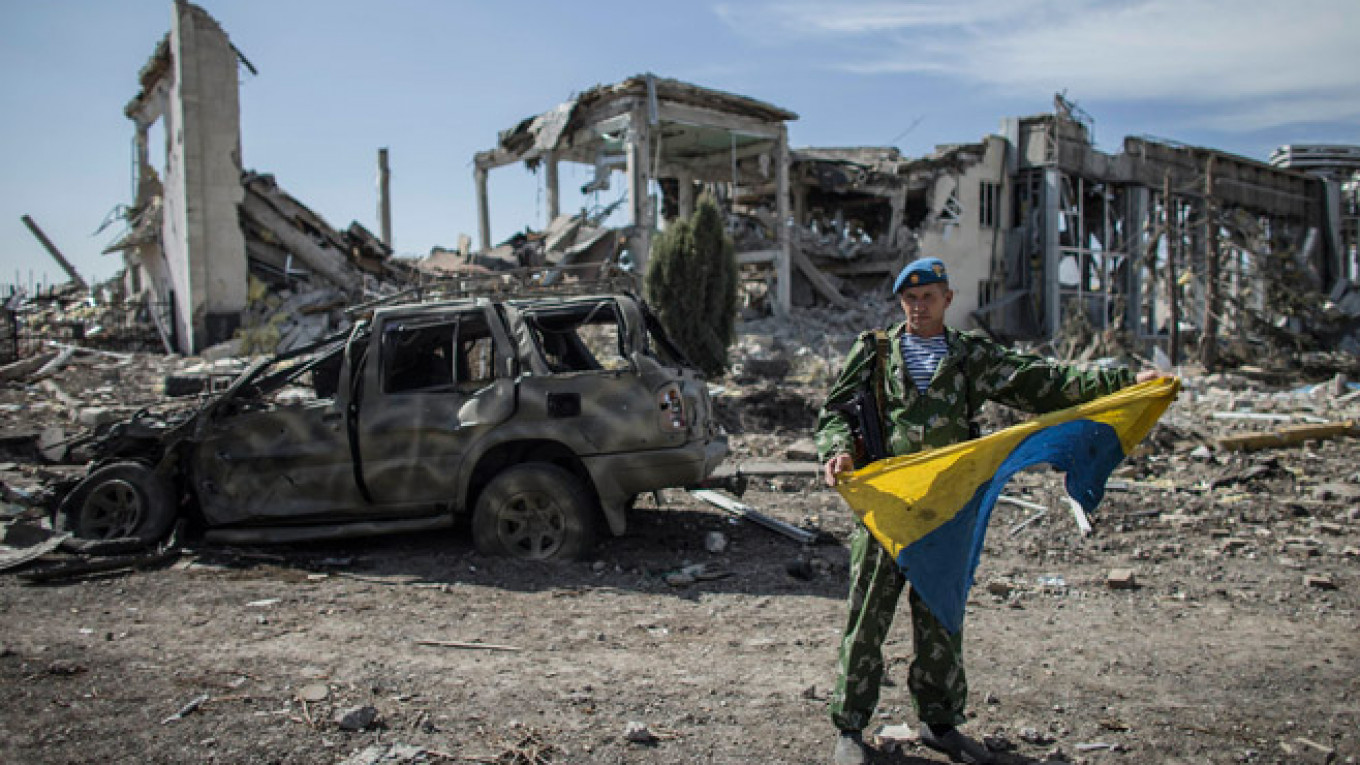It is increasingly obvious that Russia is winning in the battle for influence over Ukraine. What is not obvious, however, is what happens next and President Vladimir Putin's preferred outcome. Can he afford to sit back, or will he increase the pressure?
Russian political analyst Stanislav Belkovsky has defined Putin's goals as preventing Ukraine from joining NATO; securing de facto recognition of the annexation of Crimea; and making Ukraine ungovernable. The breakaway region of Novorossia in eastern Ukraine is a crucial instrument at Putin's disposal, but how exactly is he going to use it in the coming months?
Writing in Vzglyad, a pro-Kremlin online newspaper, journalist Pyotr Akopov laid out three possible futures for Novorossia. First, it could follow the Crimean route and be annexed by Russia — most likely with expansion into territory beyond that currently under the control of the rebels.
Second, it could be preserved as an independent buffer state of undefined status, in the manner of Transdnestr, Abkhazia and South Ossetia. In any case, it could be used as a platform to destabilize the rest of Ukraine, with the goal of increasing Russian leverage over Kiev, perhaps even restoring a pro-Russian government there.
Akopov believes that the latter strategy is the most likely scenario, since it holds the promise of the most gains for Putin.
While an uneasy peace holds in eastern Ukraine, Russia is shifting its attention to new levers of influence. With the Ukrainian economy in free fall, Russia's economic tools look increasingly important.
First, is the perennial question of gas supplies. At a meeting in Berlin on Sept. 25, the European Union energy commissioner brokered a deal under which Ukraine will pay Russia $3.1 billion for unpaid 2013 gas deliveries and will agree to prepay for at least 5 billion cubic meters of gas over the coming winter at $385 per 1,000 cubic meter. This price is halfway between the initial asking prices of Ukraine and Russia.
Second, there is the question of debt. Russia holds $3 billion in Ukrainian bonds that it is entitled to demand paid if Ukraine's debt rises above 60 percent of GDP. Given the devaluation of the hryvna, it is likely that this threshold will be crossed in the very near future. The gas bill and debt repayments can be covered by new loans from the IMF and EU — but this serves Putin's purpose, by increasing the financial burden on Ukraine's Western backers while depriving them of the opportunity to make loans conditional on much-needed reforms in Ukraine.
Third, Putin is stepping up the pressure in talks over tariffs and trade barriers. He is demanding that Ukraine start changing some of the terms of the association agreement with the EU — even though Kiev had already agreed to suspend implementation of the deal for 15 months as part of the negotiations that led to the cease-fire in the Donbass.
On Sept. 26, Russian Deputy Industry Minister Viktor Yevtukhov told Vedomosti that Russia was preparing to renegotiate with the World Trade Organization over import tariffs on manufactured goods from January 2015, which would put more pressure on the Ukrainian economy.
This flurry of activity on the economic front does not, of course, mean that the military option has been taken off the table. On the contrary, the preliminary Russian budget figures released last week envision a 21 percent increase in military spending in nominal terms, rising to $84 billion in 2015.
All in all, Putin has a broad array of tools at his disposal to continue applying pressure on the Ukrainian government. Though it is clear that the Russian economy is deteriorating, due in part to Western sanctions, the Ukrainian economy is deteriorating at a much faster rate. This means that Putin will continue to have the upper hand in Ukraine for the foreseeable future.
Peter Rutland is a professor of government at Wesleyan University in Middletown, Connecticut.
A Message from The Moscow Times:
Dear readers,
We are facing unprecedented challenges. Russia's Prosecutor General's Office has designated The Moscow Times as an "undesirable" organization, criminalizing our work and putting our staff at risk of prosecution. This follows our earlier unjust labeling as a "foreign agent."
These actions are direct attempts to silence independent journalism in Russia. The authorities claim our work "discredits the decisions of the Russian leadership." We see things differently: we strive to provide accurate, unbiased reporting on Russia.
We, the journalists of The Moscow Times, refuse to be silenced. But to continue our work, we need your help.
Your support, no matter how small, makes a world of difference. If you can, please support us monthly starting from just $2. It's quick to set up, and every contribution makes a significant impact.
By supporting The Moscow Times, you're defending open, independent journalism in the face of repression. Thank you for standing with us.
Remind me later.






